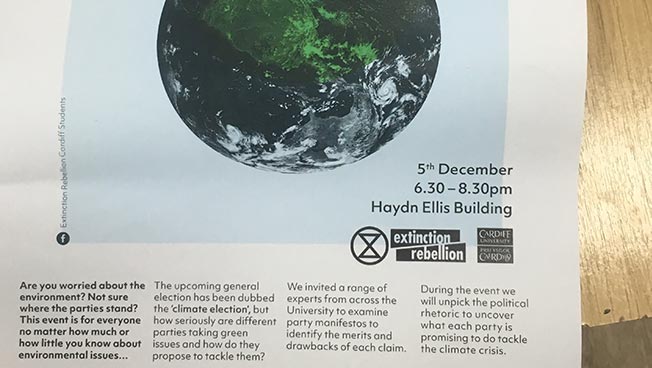Activists attempt to tackle this crisis while striking staff are taking action against issues of workload, precarity, zero-hour contracts and the climate crisis.

Climate change is predicted to require 25% of the world’s energy to by 2100 to prevent the escalation of this crisis which will require economic activity between two and three times the size of the oil and gas industry, which is already the biggest industry on the planet.
Extinction Rebellion (XR) say that their main aims are to tell the truth about the extent to which climate change is a crisis. They suggest that people don’t realise quite the scale of the problems at hand. They argue that we have the act now with the target of net zero greenhouse gasses by 2025.

“What we want is that important systemic change” said Fraser Bolitho, Cardiff University XR student arts co-coordinator. “A number of things we’re calling for, at the end of the day, are quite extreme so it’s going to take time on the uptake.”
While NASA argue that “[n]inety-seven percent of climate scientists agree that climate-warming trends over the past century are extremely likely due to human activities.” The Competitive enterprise institute (CEI) contradicts this by suggesting that only “64 [peer-reviewed] papers had explicitly endorsed anthropogenic global warming (AGW) with quantification.”

“What we have with BECCS is a probable ecological and food buying security disaster.” Said Trevor Dale, Professor in bioscience at Cardiff University. “50 of the 51 megatonnes required for the UK to reach its commitments come from BECCS.”

On the justification for university strikes across the country, “some of my colleagues don’t have contracts at all for their work so its kind of a case of addressing issues of precarity (persistent employment insecurity) more broadly speaking,” said Sam, a PhD student who will be working at Cardiff University next year. “The fact is there is absolutely no security at all, you have more security working through Jobshop.”
Trevor Dale said “[Many areas of university staff life] the workload models, precarity, zero hours contracts and so on I think [CU] have very little intention to move on that because they are integral to the marketized business model.
“They now see themselves as a large-scale businesses, they talk about their turnover and measure their importance by the salaries of their CEOs versus listed companies in the FTSE 500.”
